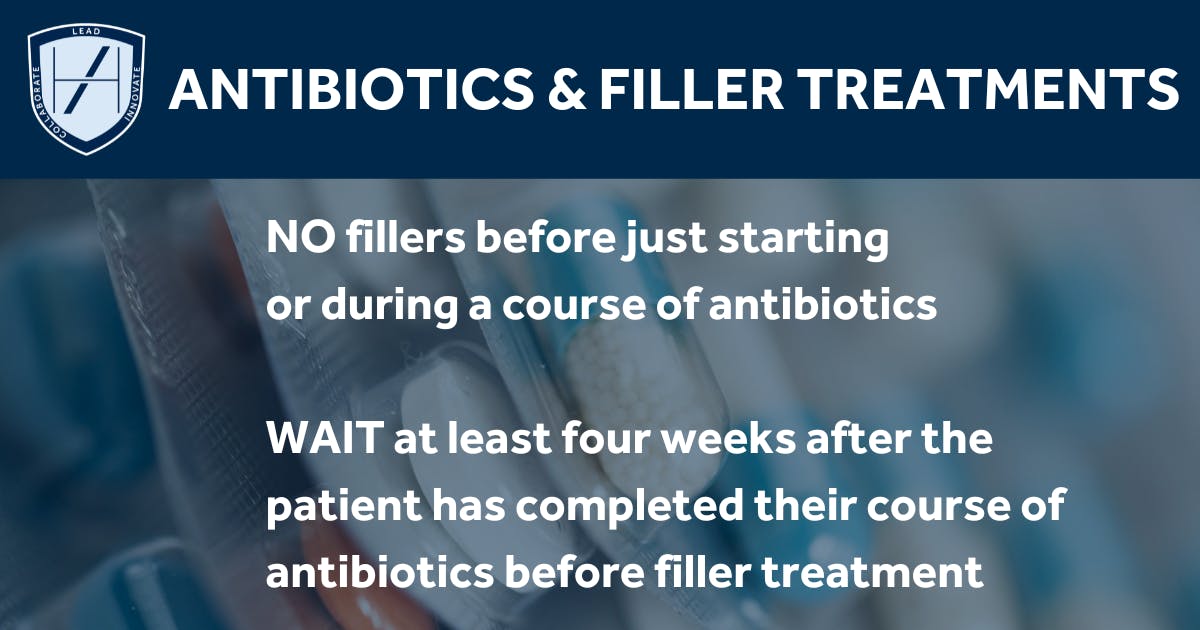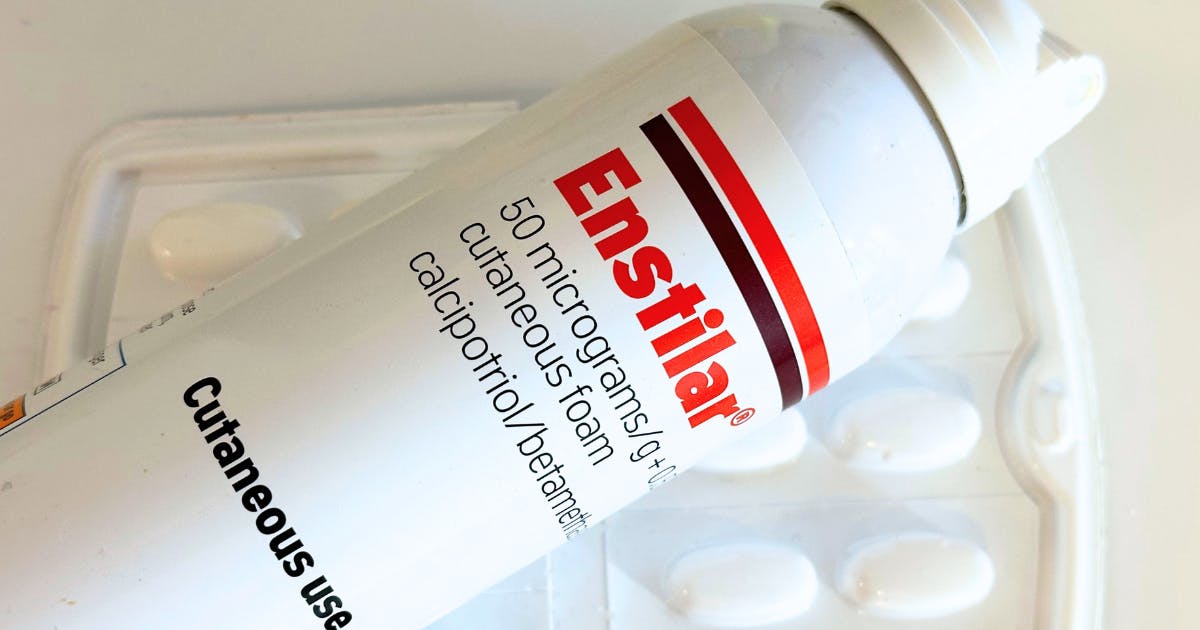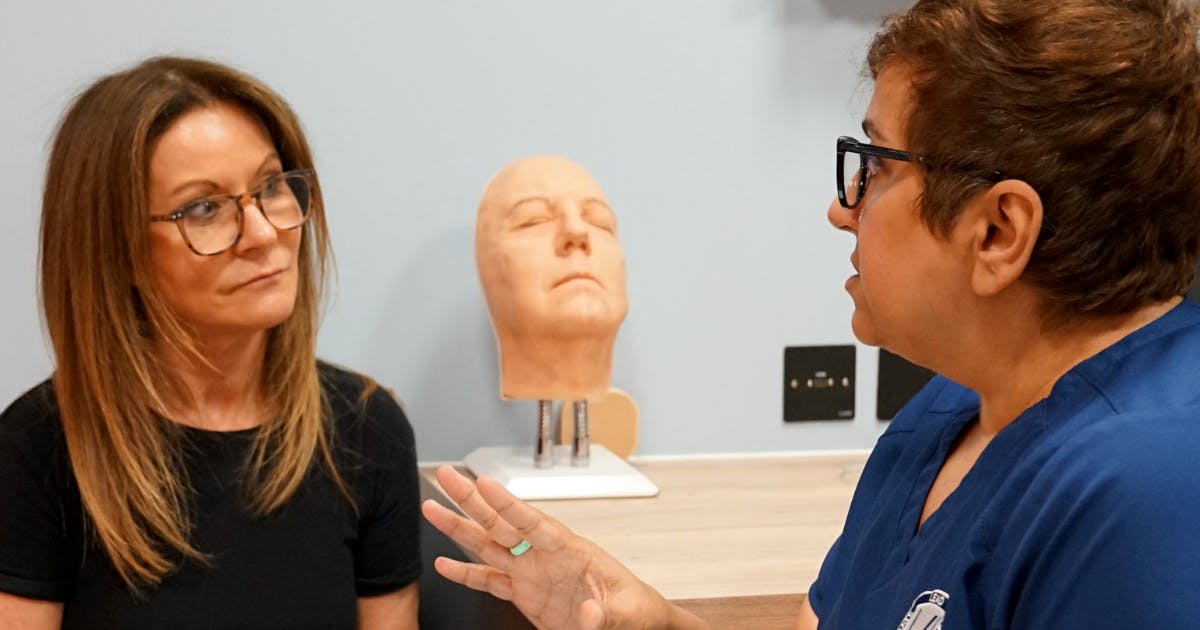Medications That Are Contraindicated for Dermal Filler Treatments

Following our article on antibiotics and botox, let’s explore medications contraindicated for dermal filler treatments.
This is something every medical aesthetics practitioner needs to be aware of to provide a thorough consultation. It’s also vital knowledge for minimising patient turnaway, so swot up below to help improve your patient management… and your bottom line!
We asked senior clinical trainer, aesthetic medicine expert and Allergan Institute Board member, cosmetic nurse prescriber Natalie Haswell for a rundown on which medications make patients unsuitable for filler treatments.
The following information relates to hyaluronic acid-based fillers. For all other filler types, for example, CaHA or PLLA, please refer to their patient information leaflets.

Can patients have filler treatments if they’re taking antibiotics?
Antibiotics are one of the most common prescription medications you’ll come across in patient histories.
Similar to the fact that some antibiotics are contraindicated for botulinum toxin treatments, generally, patients cannot have filler treatments before just starting or during a course of antibiotics.
The rationale for this is that, if there is ongoing infection, this needs to be treated first so the filler implant doesn’t get infected when implanted.
These treatments are not essential and can be delayed until the patient is well and fully recovered.
Ideally, patients should also wait at least four weeks after completing their course of antibiotics before having any cosmetic injectable treatment. This ensures their infective episode has resolved and the patient is back to being well before treatment.
Don’t skip asking your patients about dental work as part of their medical history. This can provide insight into whether antibiotics may be likely prescribed shortly. For example, if they’re concerned about potential infection and have a check-up booked.
Patients may also forget to mention antibiotics, for example, in the context of a urinary tract infection. Depending on the context, they may not see the relevance, therefore, taking a thorough history is important.

Medications contraindicated for dermal filler treatments
Several other medications are contraindicated for dermal filler treatments.
A contraindication is a reason not to take a medication due to the harm that it would cause. Absolute contraindications are where there are no reasonable circumstances for treatment due to potential harm. Relative contraindications are circumstances where the patient is at higher risk of complications from treatment, so they need to be considered with caution on a benefits vs risk basis.
Nat advises that the following medications are or may be contraindicated for filler treatment.
Please be aware that this is not an exhaustive list. We strongly encourage you to do your own research and check any medications you are unsure about. You can do this via the patient information leaflets that come with each filler product, or by asking the manufacturer, directly.
1. Anticoagulants and antiplatelets:
These medications thin the blood and increase the risk of bruising and bleeding at the injection site during and after treatment. Examples include:
- Warfarin
- Heparin
- Aspirin
- Ibuprofen
- Naproxen
- Clopidogrel.
2. Blood pressure medications:
Certain blood pressure medications, especially vasodilators, can increase the risk of swelling and bruising at the injection site. Examples include:
- Oral minoxidil (Loniten)
- Nitroglycerin
- Hydralazine.
3. Immunosuppressants:
These medications weaken the immune system to manage systemic illnesses. However, they also may increase the risk of infection at the injection site as a consequence. Examples include:
- Prednisone
- Cyclosporine
- Methotrexate.
4. Corticosteroids:
Topical and oral corticosteroids can cause skin thinning and weaken the injection site, potentially impacting the filler's effectiveness. This could also increase the risk of complications. Discuss any corticosteroid use with your patient before deciding upon their suitability for treatment.

Food supplements that need consideration for filler patients
It’s not just medications, prescription or over-the-counter, that you need to be wary of in filler patients.
Some food supplements and herbal products can affect blood clotting. Examples include:
- Ginkgo biloba
- Vitamin E
- Fish oil
- St. John's wort.
Whilst anti-inflammatory in nature, ginger and garlic are two common foods that may increase the risk of bleeding if consumed in large quantities. These can also be taken in supplement form which may increase the risk of excessive amounts being ingested.
Although these are not contraindicated for filler treatment, it’s wise to make your patients aware of this potential interaction when consenting them.
Liability and risks of treating patients on contraindicated medications
Always remember you have the right to refuse or defer treatment. None of these treatments are essential, so can be rescheduled as appropriate.
You must make your patient aware that even if their regular doctor or consultant clears them for filler, you may still refuse treatment as you are liable for the treatment.
“It’s our choice, as the injecting practitioner, if we take the risks once we’ve weighed up risk versus benefit for treatment post-holistic assessment. This is always done on an individual patient basis,” Nat confirms.

Patient safety starts with your clinical consultation
Improving patient safety through rigorous consultation protocols is one of the primary aspects of aesthetic practice. It also has the benefit of ensuring optimal treatment outcomes.
That initial conversation is the foundation for your recommendations and treatment planning - should you decide to treat. As such, it’s critical to get all the information you require to plan a safe and effective pathway that’s bespoke to your patient.
To really get to the heart of their reasons for treatment, as well as explore which treatments they may be suitable - or unsuitable - for, requires a robust framework.
Learning how to conduct a thorough patient consultation for those considering injectable treatments is something we’re passionate about. Harley Academy aesthetics courses, from our Foundation Training in Medical Aesthetics to our Level 7 Diploma in Botox & Dermal Fillers provide key guidance on this.
We’ve also covered consultation skills in the following articles, which you may like to read to refresh your memory every so often.
We recommend reviewing your consultation processes at least annually to ensure they’re up-to-date. You can also consider whether there’s any room for improvement as you become more experienced, expand your knowledge and receive patient feedback.
Information correct at time of publication
Download our full prospectus
Browse all our injectables, dermal fillers and cosmetic dermatology courses in one document
By submitting this form, you agree to receive marketing about our products, events, promotions and exclusive content. Consent is not a condition of purchase, and no purchase is necessary. Message frequency varies. View our Privacy Policy and Terms & Conditions
Attend our FREE open evening
If you're not sure which course is right for you, let us help
Join us online or in-person at our free open evening to learn more
Our Partners












STAY INFORMED
Sign up to receive industry news, careers advice, special offers and information on Harley Academy courses and services

